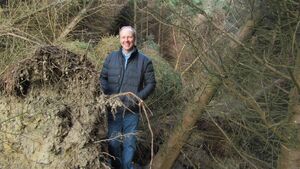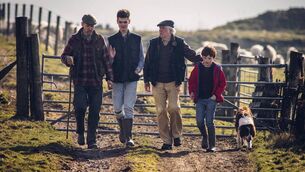24,000 hectares of forest suffered windblow damage

David Connors, chairman of Waterford Forest Owners Group.
Satellite assessment of damage to Irish forests from Storms Darragh and Eowyn is now estimated at nearly 24,000 hectares of forest, which has suffered windblow damage - more than twice the annual cut harvested.
The hardest hit areas are in the northern half of the country. Minister of State for Forestry, Horticulture and Farm Safety, Michael Healy-Rae, TD,
on February 25 launched two enhanced decision-support tools - the Tree Volume and Carbon Calculator and the Felling Decision Tool - which will assist forest owners in making informed management decisions.
Waterford Forest Owners Group welcomed the tools, which provide key financial insights, helping assess timber revenues over a forest cycle and weigh the risks of early felling versus potential further windblow damage.
Speaking on their importance, Minister Healy-Rae said: "A demonstration highlighted the major difference in value between a 22-year-old and a 32-year-old crop. The Felling Decision Tool will be particularly useful for those with partially damaged forests, helping them determine the financial impact of clearing a site versus allowing trees to mature further."
The Minister also reassured forest owners that those with the necessary licenses can proceed with clearance and replanting without fear of being disadvantaged in future assistance schemes.
Meanwhile, the Forestry Division of the Association of Farm & Forestry Contractors in Ireland (FCI) has welcomed the initiative by Minister Healy-Rae to include forestry contractors in the Forest Windblow Taskforce.
“We welcome the Minister’s recognition that Forestry Contractors have a critical role in working with the Taskforce to lead a co-ordinated stakeholder response from across the sector to ensure that storm-damaged forests are managed safely and appropriately,” said Ann Gleeson Hanrahan, managing director of FCI.
“Forestry Contractors, who are vital in ensuring timber mobilisation, will through FCI provide a central voice at the Taskforce to represent the interests of timber harvesting and haulage contractors,” she added.
Minister Healy-Rae has also recognised that harvesting timber in windblow sites is significantly slower and more costly per cubic metre than in regular forest situations. FCI Forestry Contractors members report 30% to 40% lower harvesting output in windblown sites compared with regular forest harvest situations. Harvesting costs are also higher and work output slower due to the need for greater numbers of chainsaw operators on the ground.
FCI is working closely with other European Forestry Contractor groups through its membership of CEETTAR (the European Organisation Agricultural, Rural, & Forestry Contractors, based in Brussels). Following discussions with CEETTAR members, an agreement has been reached that Forestry Harvesting Contractors coming into Ireland to help with the Storm Éowyn harvesting challenge will work as sub-contractors to Irish FCI Forestry Contractors.
According to the FCI, the pending arrival of supporting Forestry Contractors from outside Ireland remains delayed due to factors, which include the lack of a fair and transparent payment system similar to what is paid to Forestry Contractors across Europe. While the Taskforce and Minister Healy-Rae have limited control over the pricing structure, FCI is calling for the payment to Forestry Contractors to be based on the cubic metre measured output from the independently calibrated harvester head.
“Contractors from across Europe who have an established payment system based on the cubic metre measured output from the independently calibrated harvester head, cannot consider work in Ireland on any other basis,” said Ann Gleeson Hanrahan. “We welcome the Minister’s work and dedication with the Taskforce to find the solutions to harvesting windblown timber, which must include a fair and transparent system of payment for the Forestry Contractors,” she added.
Currently more than 95% of Ireland’s forest harvesting, which is valued at more than €2.3bn to our Gross Domestic Product (GDP) annually, is fully mechanized, using Forestry Contractor harvester and forwarding machines.
However, Ireland differs from the Nordic countries by the fact that Forestry Contractors in Ireland are paid according to the dry matter weight of the harvested timber. In this sale by weight system, the weight of timber removed is based on records from the weighbridge at the sawmill or processing plant along with an arbitrary dry matter conversion factor. With this flawed current payment system many FCI Forestry Contractors have been forced to pay credits back to the forest companies, resulting in less than 85% recovery rates for the work completed.
Irish FCI Forestry Contractors are required to tender much of their timber harvesting work on the basis of a cubic metre machine throughput measured on the harvesting machine head. While the investment in machine calibration is required to meet with the Coillte STICKS management system, the Forestry Contractors are not paid for their work based on the measured machine output.
“The issues faced by Forestry Contractors coming from outside Ireland, to meet the huge challenges faced by Irish timber growers in harvesting Storm Éowyn windblown timber, provide a timely opportunity for negotiated Forestry Contractor work pricing system change through the Taskforce lead by Minister Healy-Rae,” said Ann Gleeson Hanrahan.






